- Home
- Wendell Berry
Nathan Coulter Page 3
Nathan Coulter Read online
Page 3
“That’s a mighty fine crow you’ve got there,” Brother said. “Can I look at him?”
The boy said, “You can if you’ll be careful not to hurt him. Grandfather’s going to let me take him home with me.”
“Sure. I won’t bother him.” Brother put the crow on his shoulder and smoothed its feathers. “Say,” he said, “I’ll bet you don’t know much about crows.”
“Not much. Grandfather says they’ll eat about anything, and if you split their tongues they’ll talk.”
“I can show you a little trick about crows. You want to see it?”
“Yes,” the boy said.
Brother motioned to me to come and help him. I held the crow while he got the dynamite cap and the piece of fuse out of his pocket. The boy came up and watched Brother put the fuse into the cap and crimp the cap against a rock.
“Here,” Brother told me. “Hold his tail feathers up.”
I held the tail feathers up and he poked the cap into the crow’s bung-hole. I gave him a match and he struck it on his shoe.
“Now you watch,” Brother said. “You’ll learn something about crows.” He lit the fuse and pitched the crow up in the air.
The crow flew around over our heads for a minute, and Brother and I got out of the way. Then he looked around and saw that little ball of fire following him, spitting like a mad tomcat. He really got down to business then. He planned to fly right off and leave that fire. But it caught up with him over old man Crandel’s barn. BLAM! And feathers and guts went every which way. Where the crow had been was a little piece of blue sky with a ring of smoke and black feathers around it.
Brother and I took off over the fence. When we looked back the boy was still standing there with his mouth open, staring up at the place where the crow had exploded. He started to cry. I felt sorry for him when I saw that, but there was nothing to do but run.
When we got back to the graveyard we were out of sight of the Crandels’ house and we stopped running. The angel on top of the monument was looking in the direction of town. I could still hear the explosion going off.
Brother said, “He thought a lot of that crow.”
“He was crying,” I said.
It was late; but we wouldn’t have supper until dark, after Daddy quit work, and we didn’t hurry.
“Do you think Mrs. Crandel heard the explosion?” I asked.
“If she wasn’t dead she did.”
“If she didn’t he’ll tell her.”
“Whoo,” Brother said.
Big Ellis and Gander Loyd had gone home by the time we got to town. Mushmouth and Chicken Little Montgomery were sitting by themselves in front of the drugstore, and we walked down the other side of the street to keep them from seeing us. If one of them had pointed at us and said, “There go Tom and Nathan Coulter, and they just blew up a poor old boy’s crow,” we couldn’t have said a word. The sun had gone down and the nighthawks were flying. I was glad Brother and I were together.
When we were outside town again Brother said, “We’ll tell Uncle Burley about it when we get home. He’ll get a kick out of it.”
That made us feel a little better. But Uncle Burley was still at the fence row with Grandpa and Daddy when we got there. They were busy, and we didn’t go where they were.
By the time we got home that evening Mrs. Crandel had telephoned our mother and told on us. Mother made us stay at the house until Daddy came in from work. We sat on the back porch and waited for him.
When he came Mother told him what we’d done, and he cut a switch and whipped us. He was already mad at us for riding old Oscar, and he whipped us for that too while he was at it.
“Now I know what that crow felt like,” I told Brother.
“That crow never felt it,” Brother said. “He was dead before he heard the explosion.”
The next morning Daddy said that if we didn’t stay out of trouble he’d take up where he left off the night before. After he went out of the house Mother told us not to feel bad because he was mad at us. He was just tired, she said.
It started raining that afternoon, and rained off and on for a couple of days. The wet weather kept Daddy from working in the field; that gave him a chance to rest and he got into a better humor. He let us stay with him while he did odd jobs around the barn, and we enjoyed each other’s company.
On the morning after the ground had dried Daddy hitched the team to the cultivator and drove to the tobacco patch. We watched him leave; and then we fed Mother’s chickens for her because she wasn’t feeling good.
After a while we saw Grandpa riding his saddle mare across the field toward our house, and we ran to open the lot gate for him.
“Where’s your daddy?” he asked us.
“Plowing tobacco,” Brother said.
He turned the mare around and rode back through the gate. Brother and I watched him go up the ridge. When he rode the mare he kept his walking cane hooked over his arm. Mother said he carried the cane because he was old, but mostly he used it as a riding whip. He could walk almost as fast as Daddy, poking the cane straight out in front of him as if to get the air and everything out of the way so he could move faster. He always hurried, even across a room, setting his feet down hard. You could never imagine him turning around and going the other way. When he walked through the house he made the dishes rattle in the kitchen cabinet, and you half expected to find his tracks sunk into the floor. He was tall and lean, his face crossed with wrinkles. His hair was white and it hung in his eyes most of the time when he wasn’t wearing a hat, because he didn’t use a comb for anything but to scratch his head. His nose crooked like a hawk’s and his eyes were pale and blue.
Before long he came over the ridge again, and Daddy came with him. Daddy had unhitched the team and the wind blew the sound of the loose trace chains down into the lot. Grandpa rode through the gate ahead of him and unsaddled the mare and put her in a stall, and then helped unharness the mules.
“Did you get done, Daddy?” Brother said.
“No,” Daddy said. He sounded mad again.
I was going to ask him why he’d quit, but Grandpa told me to get out of the way before one of the mules kicked my head off.
“They won’t kick me,” I said. “I feed them all the time.”
He looked at me and snorted. “Shit,” he said.
When they got the mules unhitched Daddy went to the house, and Grandpa led the mules to the barn to put them in their stalls. Brother and I followed him into the driveway. “Didn’t I tell you to stay away from these mules?” he said. “Go to the house.”
Daddy was in the kitchen talking to Mother when we came in.
“What’s going on?” Brother asked.
Daddy didn’t answer. He went out and started the car, and he and Grandpa drove off toward town.
In about half an hour they came back. Uncle Burley was slouched between them in the front seat. Grandpa got out and hooked his cane around Uncle Burley’s arm and told him to come on out of there. Uncle Burley crawled out and stood up, holding on to his head with one hand and on to the car door with the other one. He hadn’t shaved for two or three days, and his whiskers were matted with blood and dirt.
There was a knot on the left side of his head, starting above the ear and ending in a cut an inch long across his cheekbone.
“Hello, Uncle Burley,” I said.
“Well now,” he said, “good morning boys.” He let go the door to wave to us and fell down in a pile.
“For God’s sake, look at Uncle Burley,” Brother said.
Daddy and Grandpa picked him up between them and helped him into the house. Mother filled a pan with hot water and got the iodine out of the medicine cabinet and followed them to the living room. They stretched Uncle Burley out on the sofa and Mother began washing the blood off his face. She was gentle with him, and washed carefully around the cut so it wouldn’t hurt.
“What did he hit you with, Burley?” Daddy asked.
“Jack handle. Surely must have been
a jack handle.”
“It’s a damned shame he didn’t use the jack,” Grandpa said.
Mother finished washing Uncle Burley’s face, and then poured some iodine into the cut. He whooped and sat up.
Grandpa jobbed the cane into his ribs. “Lay down there, God damn it.”
Uncle Burley lay down again and let Mother bandage his face. Then they got him up and led him out to the kitchen. Brother and I kept out of the way and watched them set him down at the table. Mother poured him a cup of coffee, and she and Daddy and Grandpa went out on the back porch and began talking.
Uncle Burley’s hands shook so much that he splashed some of the coffee out into his saucer; he tried to drink it out of the saucer and shook it all over his shirt.
He saw Brother and me watching him and grinned at us. “Now boys,” he said, “let Uncle Burley tell you something. Don’t ever drink. It’s bad for you.” Then he said, “But if you ever do drink be sure to get to hell away from home to do it.” He set the coffee cup down and touched the side of his head with his fingers. “If you ever drink, and you ever get in a fight, always try to make an honorable show.” He laid his right hand on the table so we could see it. It was skinned up across the knuckles and the middle finger was out of joint. “Boys,” he said, “I was after him just like a hay rake.”
He finished the cup of coffee and Brother got the pot and poured him another one. He put an arm around each of us and said, “Don’t let on to the rest of them, but Uncle Burley was drunk.”
He told us to keep it to ourselves, because there were some things that were a man’s own business. We said we’d be quiet about it.
“It don’t pay to talk too much about your business,” he said.
When he’d finished the second cup of coffee Grandpa and Daddy loaded him back into the car and started home with him. Mother told us to stay in the kitchen and help her, but she had to leave the room for something and we ducked out the back door.
We cut across the field and got to Grandpa’s house just as they were helping Uncle Burley out of the car again. Grandma was in the kitchen cooking dinner. When she saw them coming across the back porch with Uncle Burley, she dropped a pot full of green beans on the floor, and stood there saying, “Oh Lord, oh Lord.”
Then she hurried to help them bring Uncle Burley in. Grandpa told her to get out of the way; Uncle Burley wasn’t dead yet, he said. Grandma’s old yellow cat started rubbing against Grandpa’s leg and purring. He took a cut at it with his cane, but missed.
“Scat, damn you.”
The cat backed off a little, and then followed them into the house and up the stairs. Grandma fixed Uncle Burley’s bed and they undressed him and put him under the covers. He really did look sick then. Under the whiskers his face was as white as the pillow. Grandma leaned over him and smoothed the covers and asked if there was anything he wanted.
“That’s right, by God,” Grandpa said. “You coddle him.”
They looked at each other for a minute; and Grandpa turned around and started out of the room, the cat weaving in and out between his feet. He took another swing at it with his cane as he went out the door, but missed again.
Grandma looked at Uncle Burley and said, “Lord help us. I don’t know what’s going to become of us.”
“Shhhh,” Uncle Burley said. “It don’t pay to talk too much.”
She sat down beside him on the edge of the bed, rolling her hands into her apron. “Oh, Burley. Why do you have to be so bad, Burley?”
Daddy took Brother and me down the stairs.
“Is everything all right?” I asked him.
“It’s going to be.”
When we went out on the back porch Grandma’s cat was hanging by a piece of string from a limb of the peach tree. It didn’t look as if it ever had been alive. The wind swung it back and forth just a little.
“Look at that old cat,” Brother said.
2
Our mother had been sick since I was born, Daddy told us. And she began to get worse. She had to spend more and more time in bed, until finally she didn’t get up at all. Grandma came every day and cooked our meals for us and did the housework, and took care of Mother while Daddy was in the field.
Daddy got short-tempered with us, and stayed that way longer than he ever had before. He took us to the field with him every morning to keep us out of the house and we stayed with him all day. It was hard to have to be with him so much. Brother and I were careful not to aggravate him, but scarcely a day passed that we didn’t get at least a tongue-lashing from him. He was worrying a lot and working hard, and the least thing could set him off. The worst times were when we came to the house at noon and at night. He wouldn’t let us make a sound then.
I quit having the dream about the lion, and began dreaming things that woke me up in the middle of the night. I came awake sweating and afraid, but I could never remember what I’d dreamed. It always took a long time to get used to the room and the darkness again and go back to sleep.
On one of those nights when I woke up I heard Daddy talking on the telephone. I couldn’t hear what he said, and I dozed off again until I heard a car come in the driveway and stop beside the house. The door of the car opened and slammed; and I heard Daddy’s voice and then the doctor’s on the front porch. They came inside and their footsteps went down the hall and into the room where Mother and Daddy slept. Before long the back door opened and I heard Grandma talking to Daddy in the kitchen. “I saw the light burning and thought I’d better come over,” she said.
They went into the bedroom and it was quiet again for a while. I went back to sleep finally. But I woke again several times before morning, and each time I’d hear them talking quietly downstairs and tiptoeing over the floors. The last time I woke the sky was turning gray. I heard the doctor’s car leaving.
Nobody called Brother and me to wake up, and we slept a little past the regular time. When we got dressed and went downstairs Daddy was standing in the living room looking out the window. He didn’t speak to us, and we crossed the room and started down the hall to the kitchen. Grandma opened the bedroom door and came out, shutting it quickly behind her. Her face looked tired, and her eyes were red.
“Boys, your mother’s dead,” she told us.
She stood there watching us. I nodded my head, and Brother said, “Yes mam.”
She walked down the hall. “Come with me. I’ll fix your breakfast.”
We followed her into the kitchen and sat down in our chairs at the table. The sun wasn’t up far; the light came in at the windows and stretched halfway across the room before it touched the floor. Off in the distance I could hear somebody calling his cattle.
Grandma took the lids off the stove and kindled a fire. When it had caught she added wood and set the lids back in place. She put the skillet on and got out the bacon and eggs while the stove warmed and ticked in the quiet.
Daddy came into the kitchen while she was filling our plates.
“Here’s some breakfast for you,” Grandma told him. “Eat. You’ll need it.”
He didn’t answer her. He went on out the back door. After a minute we heard his axe at the woodpile.
We weren’t long eating. When we’d finished we went out where he was. He didn’t notice us. We sat down on a log at the edge of the woodpile and watched him. He took a chunk of sawed wood from the pile and propped it against the chopping block. He swung the axe over his head, sinking the blade, and drew it out and swung again. The chunk split clean, down the middle. Then he split each of the halves and threw them into another pile. Every time the axe came down he said “Ah!”—the keen sound of it ready to turn into crying, until the bite of the axe stopped it; and he tightened his mouth and swung again.
The undertaker came in his black hearse and took our mother’s body away. Then some of the neighbors began coming. Big Ellis and his wife came, and the preacher and Gander Loyd and Beriah Easterly and his wife and Mrs. Crandel. As they came in they looked at Daddy working there at the
woodpile, then stood on the back porch with the others and watched him, wondering when he’d quit and come to the house and allow them to speak to him.
Grandpa came, riding his mare into the lot, and stopped on the other side of the woodpile. He looked at Daddy for a minute, as if he wanted to tell him to quit or say something to comfort him. He looked away finally and sat still, only jerking the bridle reins a little when the mare got restless and began to paw and toss her head. Daddy never looked up from his work. The axe blade glinted in the sun and came down. Grandpa spoke to the mare and rode home again.
When Daddy had split all the wood, he stuck the axe into the block and started to the house. The people watched him cross the yard; when he came to the porch they turned away from him, embarrassed because they’d come to say they were sorry and the look of him didn’t allow it.
They backed away from the door to let him through. He went into the bedroom and cleaned up. When he came into the living room he stood at the window again, not speaking to any of them.
The preacher told Brother and me that we should go upstairs and put on clean clothes. “You must be quiet,” he said. “Your mother has gone up to Heaven.”
“We know it,” Brother said. “We knew it before you did.”
As we were going up the stairs Mrs. Crandel came to the living room door and said, “Do you boys want me to help you get dressed?”
Brother said, “No mam.”
“Do you know where to find everything?”
“Yes mam.”
We went upstairs to our room and poured some water into the washpan. The sun came through the window curtains and made their shadows on the floor. When the wind waved the curtains the shadows on the floor waved.
“Let’s both wash at the same time,” Brother said.
I said all right. We put the pan between us on the floor and began washing. Brother squeezed the soap and it flew out of his hands and splashed water on me. I splashed back at him; both of us laughed. He started snapping at me with the towel and I caught the end of it, trying to pull it away from him.

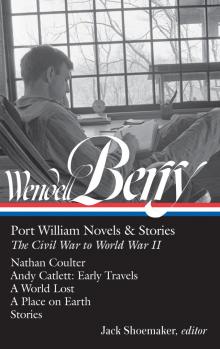 The Selected Poems of Wendell Berry
The Selected Poems of Wendell Berry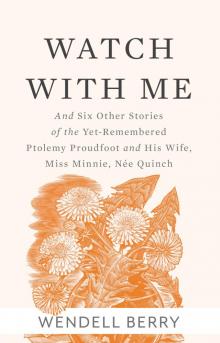 Watch With Me
Watch With Me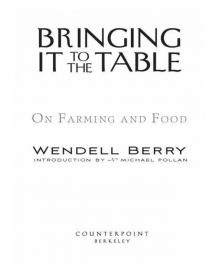 Bringing It to the Table: On Farming and Food
Bringing It to the Table: On Farming and Food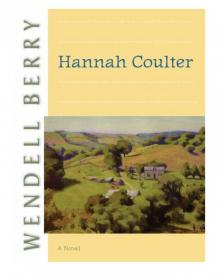 Hannah Coulter
Hannah Coulter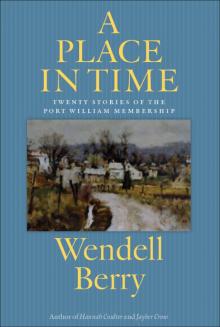 A Place in Time: Twenty Stories of the Port William Membership
A Place in Time: Twenty Stories of the Port William Membership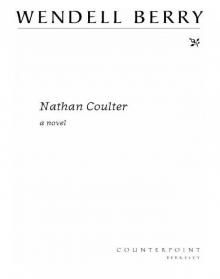 Nathan Coulter
Nathan Coulter Why I Am Not Going to Buy a Computer
Why I Am Not Going to Buy a Computer A Place on Earth
A Place on Earth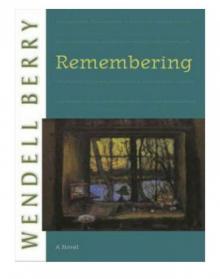 Remembering
Remembering New Collected Poems
New Collected Poems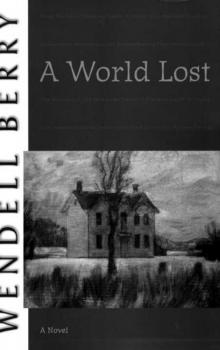 A World Lost
A World Lost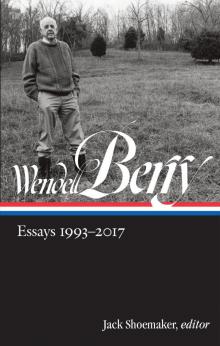 Wendell Berry
Wendell Berry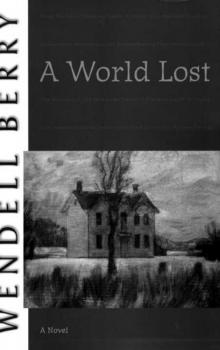 A World Lost: A Novel (Port William)
A World Lost: A Novel (Port William)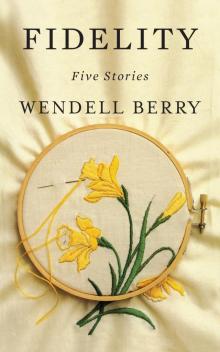 Fidelity
Fidelity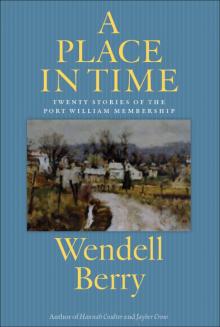 A Place in Time
A Place in Time